Ishinomaki, Miyagi Prefecture
Day Two: 29 March 2011
Up early again. We split up into two groups. One group will work to clear rubble and help clean up damaged houses and public areas. The second group will cook food for people staying in a junior high school that has been converted into a shelter for about 900 refugees. People are also living in the neighboring houses; they need help, too.
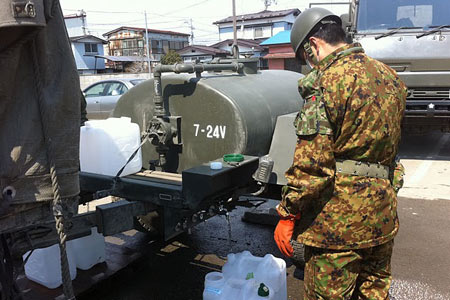
Self-Defense Forces provide drinking water from a giant tanker
Today I am with the cooking group. There is a place where the SDF provides drinking water from a giant tanker. We go down to get some water for cooking rice. The SDF people are there to help. While we are filling up our water jugs, two small children who are obviously brother and sister come to get some drinking water. In their arms are four empty bottles and a bucket. I ask them whether I can help to carry the heavier water vessels for them. With heartbreaking kindness and respect, they turn down my offer. To the SDF members, they bow deeply and say, “Thank you very much for your hard work and all your help.” Even after that, they press a candy into the hands of each soldier. As we drive away, they are waiting and waving to us with their little hands and shy smiles. I know these children have lost their houses and their stomachs are not full. But they are smiling at me and I can only smile back. I am hoping we see them later when we are distributing the food.
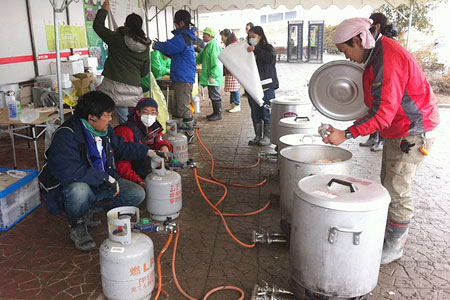
set up our kitchen tent outside a school that has been converted into a temporary shelter
Outside the school/shelter, two dogs are tied up. No one knows who they belonged to before the tsunami—now they belong to everyone at the shelter. Every time children pass by the dogs, they call them by their new names, Shiro (white) and Chibi (small one), and pat their heads with affection. The dogs are also very excited to be rubbed by the children—they stick their tongues out and shake their tails happily. Both dogs and in some cases the children too have been recently orphaned—I can see that in these small interactions, they are helping each other to heal.
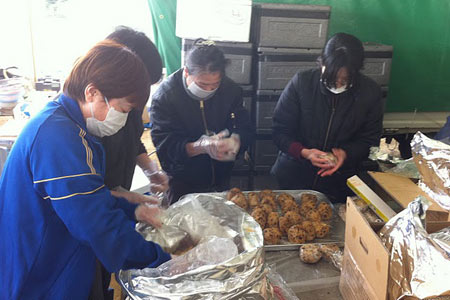
IVUSA volunteers work alongside a tsunami refugee women who come out to help us prepare the onigiri.
We set up our kitchen tent, and then cook hot soup and make Japanese onigiri rice balls. Some women who are staying in the temporary shelter come out to help us prepare the onigiri. Another group of women also joins us. They have come from further north—a place called Niigata which was hit by a serious earthquake in 2004. So many volunteers came to help Niigata then, and now they are here to return the favor. They have brought fresh vegetables—daikon, mushroom, negi, carrots and more—and they have spent the last two days chopping them. They say they are happy to be able to do something for the people here, after all that was done for them in their time of need. They have also come with a message for the people here, which they are eager to share: “With help, we overcame terrible difficulties, and we know that you can also do it for sure!”
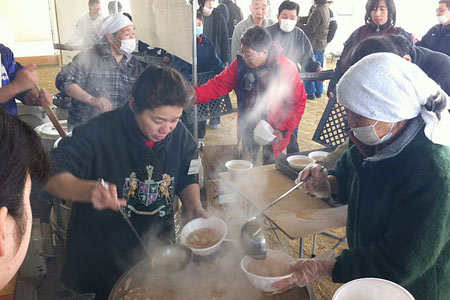
In the cold weather, the refugees are happy to have some warm comfort food.
When we bring the food to the shelter, we are met with lots of spontaneous smiles. In the cold weather, the refugees are happy to have some warm comfort food. They keep bowing and saying “thank you thank you” as we serve them. We are likewise happy to see smiles break across their faces which have clearly seen so much hardship in the past days. They tell us that in the first days after the tsunami, they got only one small rice ball to share among three people, and that only after waiting in a long queue. They say they didn’t know how to divide it among three people it is because it is so small. But they were happy to share with each other. Sometimes they did not get anything to eat and they just drank water to fill the stomach.
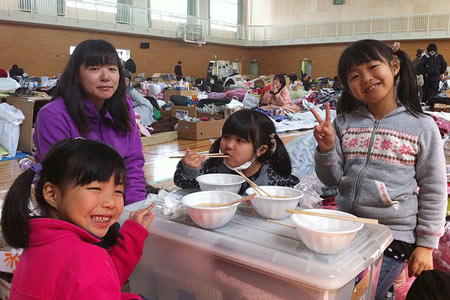
in the first days after the tsunami, they got only one small rice ball to share among three people.
Some people come out to the tent to help us clean up, serve and even load the truck back up when we are done. In the end, almost all of them come out to say thank you to us. Everybody is shaking our hands.
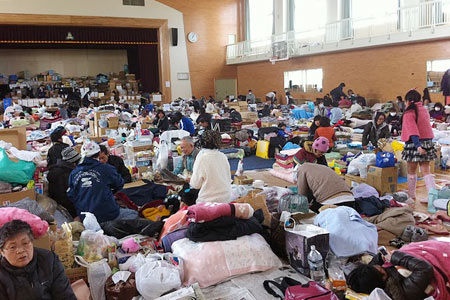
These people here lost everythig. But they are not destroyed
I am struck that we came here to help them, but they have given us so much happiness. Everyone’s—ours and theirs—eyes are filled with tears. These people here lost everything—their houses are washed away, many of them lost family members. But they are not beaten—they joke with us as we work, and I see even older people working hard, cleaning toilets and rooms. The young people go out and help to clear away rubble and clean up the damaged houses. One man tells me, “I have lost everything. My house is gone, and I don’t know what to do.” As he speaks, he is looking up the sky with a gentle smile. Then he looks back at me and says, “Still I try to keep a positive attitude and do my best…” I find myself wondering if I could keep up the same positive spirit if I was in his circumstances. It is impossible not to have a deep respect and admiration for these people.
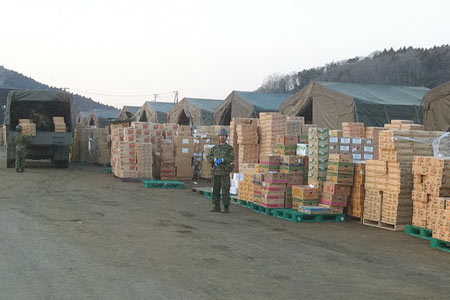
SDF base is open 24 hours, both for receiving supplies and for distribution
Later we go to the SDF base to pick up some underwear, shampoo, coffee, etc. to bring back to people in the temporary shelter. I was surprised to see the huge stock of all kinds of supplies at the base. They are distributing to the temporary shelters and the NGO organizations like us can pick up whatever we think we can distribute, after completing the necessary paperwork. We are told that this is the central distribution point in Ishinomaki City for all the supplies from all around Japan and what has been shipped in from different countries are. The base is open 24 hours, both for receiving supplies and for distribution. It is a very good start—and they are doing a good job at getting the supplies to the temporary shelters. It is more difficult to reach the people who are still staying in their homes or the homes of relatives. They are also in great need but so far it hasn’t been possible to reach them. There are other obstacles as well—for example, the distribution point has received lots of instant noodle packages, but there are no facilities at the shelters to heat water, so it is very difficult to prepare them.
Today also we had a couple of long and big earthquakes.
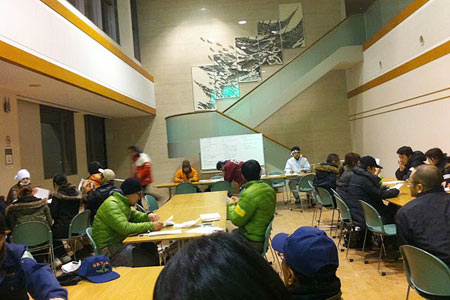
Different teams - medical, cooking, clean-up, even animal protection - meet in small groups.
Every night there are meetings on the campus of the local university, where a kind of volunteer headquarters has been established. Representatives of all the volunteer organizations here exchange ideas and information about the location of temporary shelters, the best places to cook food, which areas need help with clean-up, medical information… there are even veterinary doctors sharing information on how to protect animals. The main thing that is clear is that more people are needed to clean up the houses and public spaces… so much devastation. Also another thing that comes up is that it is really important to check with the refugees what they really need, and not just come up with our own ideas and bring them what we think they need. Here also, small groups partner with each other in order to be more effective. So many groups coming and going. On our next trip, we plan to stay in a tent in on the campus lawn here—the whole lawn is dotted with the tents of volunteers.
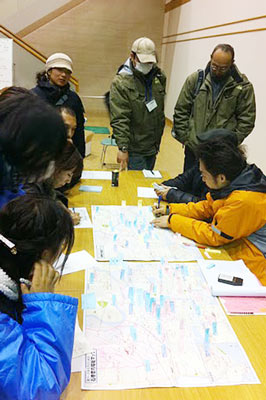
The groups share information on locations of temporary shelters and cooperate to ensure that each shelter is served.
Most people—both refugees as well as volunteers—haven’t been able to take a bath for more than 10 days, since in many places there has been neither running water nor electricity. Finally the electricity is fixed and water is slowly reaching the area. Even then, it’s too cold here to take a cold bath. The SDF has arranged hot baths for some people. They told me that was bliss. I haven’t had a bath since leaving Tokyo. We haven’t eaten much—we didn’t want to eat the food we prepared for the refugees, as that would have been taking food from their mouths, and we know they need it so much worse than we do. Most of us are just eating a cup of instant noodles in the morning before we go out and again at night before we sleep. I don’t give it much thought—I know the tiny hardship we are undergoing is nothing compared to those we serve. Mostly I am filled with gratitude for this precious opportunity to serve people here. Cold outside but the overall feeling is one of unforgettable warmth.
-Viveka
Join the conversation! 1 Comment
Leave a Reply
You must be logged in to post a comment.

Thank you for the posting. Your selfless services to those in need will spread divine fragrance soaked in the sweetness of Love and that will take you close to Amma. Certainly Amma will be proud for Her such dedicated and compassionate children. Indeed you people are blessed ones and worthy for Her divine grace. Amma sharanam